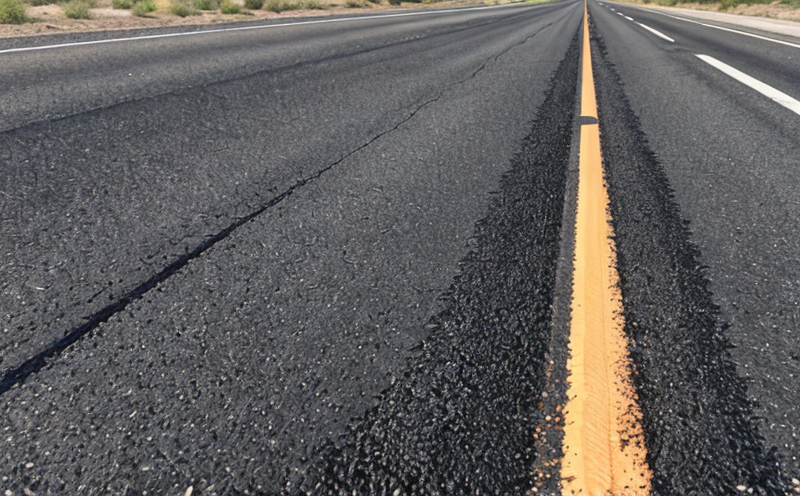EN 12697 Wheel Tracking Testing of Pavements
The European Standard EN 12697-1 specifies the method to determine the resistance to rutting in asphalt pavements under wheel load. This standard is crucial for assessing the durability and longevity of pavement layers, ensuring they can withstand repeated traffic loads over their intended service life. Rutting occurs when the surface deforms under the weight of vehicles, leading to a loss of ride quality and increased maintenance costs.
The test method involves creating a series of wheel tracks in an asphalt specimen using a standard wheel load. The specimens are then tested for deformation at specific intervals after loading. This process allows for the assessment of how different pavement mixes perform under stress. The results provide critical insights into the material's resistance to rutting, which is essential for selecting appropriate materials and designs.
The testing procedure typically starts with specimen preparation. Samples are cut to specified dimensions and placed in a heated mold to simulate real-world conditions. Once cooled, the specimens are tested using a specially designed wheel tracking machine that applies a standard load and records deformation at regular intervals. The apparatus used includes a loading platform, a wheel system capable of applying the required loads, and displacement sensors.
Acceptance criteria for EN 12697-1 testing involve measuring the depth of rutting in millimeters after a specified number of passes under load. Compliance with these standards ensures that pavement materials meet the necessary durability requirements, contributing to safer and more efficient transportation infrastructure.
In real-world applications, this test is used by quality managers, compliance officers, and R&D engineers to evaluate new asphalt mixes, optimize designs, and ensure that pavements will perform as expected under traffic loads. The results of EN 12697-1 testing can influence procurement decisions, helping companies select the most suitable materials for their projects.
- Customer Impact and Satisfaction: By ensuring compliance with international standards like EN 12697-1, customers gain confidence in the quality of their pavement layers. This leads to increased customer satisfaction as they can expect longer-lasting pavements that require fewer maintenance interventions. The test also helps in reducing lifecycle costs by selecting materials that perform better under stress.
The testing process is critical for maintaining high standards in building and infrastructure projects, particularly those involving asphalt pavement construction. By adhering to this standard, engineers can design more resilient pavements that meet the demands of modern transportation systems.
Eurolab Advantages
At Eurolab, our commitment to excellence in testing and quality assurance is reflected in every service we offer. Our EN 12697-1 wheel tracking tests are conducted by highly skilled technicians using state-of-the-art equipment. This ensures that the results are accurate and reliable.
- Expertise: Our team of professionals has extensive experience in pavement testing, allowing us to provide comprehensive support throughout the testing process.
- Technology: We utilize cutting-edge machinery and software, ensuring precise measurements and data collection.
- Compliance: All our tests are conducted according to international standards such as EN 12697-1, guaranteeing that results meet the highest quality benchmarks.
- Consistency: Our rigorous quality control processes ensure consistent and repeatable test results, allowing for accurate comparisons over time.
The combination of our expertise, technology, and commitment to compliance sets Eurolab apart as a trusted partner in pavement testing. We are dedicated to helping our clients make informed decisions that lead to better infrastructure projects.
Customer Impact and Satisfaction
- Better Decision-Making: By providing accurate test results, Eurolab enables customers to make more informed decisions about their pavement materials and designs. This leads to higher-quality projects that meet or exceed industry standards.
- Cost Savings: Ensuring compliance with EN 12697-1 helps reduce lifecycle costs by selecting materials that perform better under stress, thereby extending the life of pavements.
- Enhanced Reputation: Customers who work with Eurolab benefit from a reputation for quality and reliability. This enhances their standing in the industry and fosters trust among stakeholders.
- Faster Project Completion: Reliable test results provided by Eurolab can expedite project timelines, as there is less need for retesting or corrective actions due to non-compliance.
Our focus on customer satisfaction ensures that every client receives the support they need to achieve their goals. By leveraging our expertise and resources, we help clients build better infrastructure that stands the test of time.
International Acceptance and Recognition
The EN 12697-1 standard is widely recognized across Europe and beyond for its rigorous approach to evaluating pavement resistance to rutting. This international acceptance underscores the importance of adhering to such standards in ensuring high-quality infrastructure.
The European Committee for Standardization (CEN) has established this standard as a benchmark for quality, which contributes to the harmonized development of technical specifications and standards across Europe. The use of EN 12697-1 is not limited to European countries; it is also adopted by countries with similar regulatory frameworks, ensuring consistency in testing methodologies.
The recognition of this standard extends beyond mere compliance; it reflects a commitment to excellence that aligns with global best practices. By adhering to such standards, projects gain credibility and are more likely to attract investment from reputable sources. This international acceptance also facilitates collaboration between different countries and industries, promoting knowledge sharing and innovation in pavement testing.
The widespread adoption of EN 12697-1 demonstrates the importance of consistent quality measures in building and infrastructure sectors. As such, it plays a crucial role in maintaining high standards and ensuring that projects meet the necessary durability requirements.





